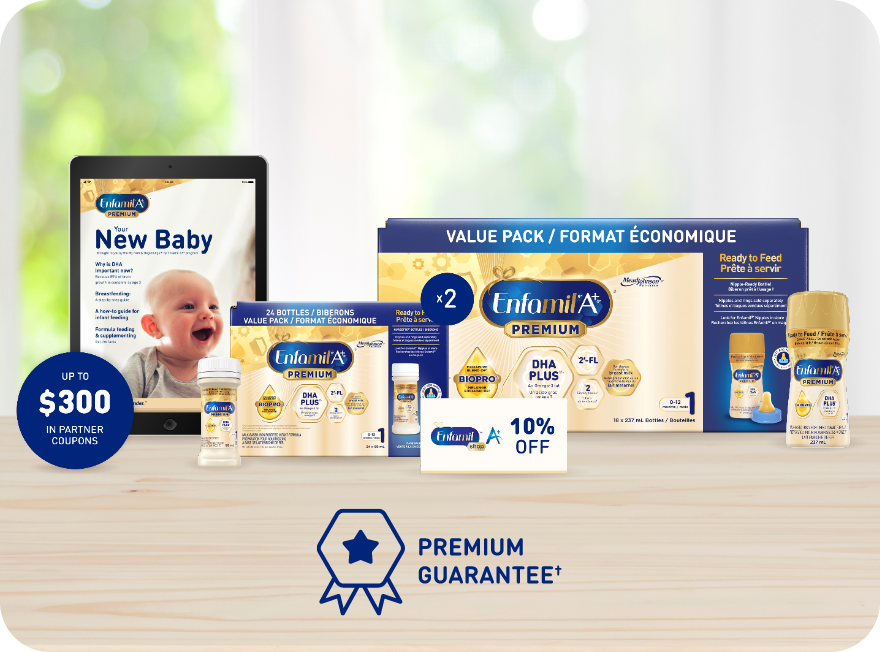Your little one’s entrance into the world is cause for celebration, but new parents may feel anxious about keeping their new baby safe and healthy. Read on for some tips for boosting your newborn’s immune system.
How To Support Your Newborn’s Immune System
Parents spend a lot of time stressing about how to keep their children safe and healthy. While it’s important to keep your toddler away from sharp objects, and to keep an eye on the things your newly crawling baby puts in their mouth, supporting your newborn’s immune system can give them a head start on a lifetime of better overall health.
Your infant’s immune system becomes more mature when they reach about seven to eight years of age.1 Newborn’s immune system can’t handle bacteria and viruses as well as older baby’s.2 Thankfully, newborns have some protection from their mothers’ immune systems, thanks to antibodies that were shared through the placenta during the third trimester, which stay active for the first few weeks of a baby’s life.2 Additional antibodies are shared via the mother’s breastmilk, which can help them to stay healthy in the months before receiving their first vaccines.2 While these shared antibodies offer some protection from bacteria and viruses, there are other things that parents and caregivers can do to support their newborn’s immune system:
Healthy Pregnancy
When mothers learn that they are pregnant, their doctors will give them some tips for having a healthy pregnancy. They may be advised to take a prenatal vitamin and eat a well-balanced diet so that their baby can properly develop. Mothers are also encouraged to stay active and exercise during pregnancy.
Breastfeeding
While the decision to breastfeed a newborn is a personal one, breast milk—especially colostrum—contains antibodies that can help your little one prevent and fight infection.3 Other components of breast milk, like fats, and white blood cells work to fight infections in your baby’s gastrointestinal tract, while other proteins like lactoferrin and interleukins, support a baby’s immune system by balancing the body’s response to inflammation.3 In short, breast milk helps set the stage for a protective and balanced immune system that can recognize and fight disease and infections. Research has even shown that breastfed babies are less likely to suffer from childhood leukemia and lymphoma, and have lower instances of ear infections, pneumonia, and certain types of meningitis2.
However, breastfeeding isn’t an option for every family, and some parents may need to supplement with formula. Enfamil A+ Premium is our closest formula to breast milk with expert recommended levels of brain-building DHA and the exclusive DuoFibre* blend to promote babies’ immune-supporting bacteria.
Vaccinations
One of the best things that parents can do for their children’s health is to see that they are vaccinated. In Canada, vaccines are available that prevent illnesses such as tetanus, polio, rotavirus, measles, hepatitis B, rubella, and influenza.4 Vaccines function by allowing the body to make memory cells, which help the immune system respond quickly to an infection and protect against harmful germs.5 The Canadian Pediatric Society recommends that all children over six months old get an annual flu shot, and that parents keep their children up to date on routine vaccines.4 The diseases prevented by infant and childhood vaccines are serious and can be deadly.4 For example, polio can lead to paralysis and measles can lead to brain damage and death.4
Encourage Good Sleep Patterns
You’re more likely to get sick when you aren’t well rested. When you don’t get enough sleep, your body doesn’t produce as many proteins called cytokines. Certain cytokines help reduce inflammation and fight infection.6 Babies younger than three months old need 14 to 17 hours of sleep every day7. Adequate sleep is beneficial to our immune system!
Keep Homes Free from Smoke
Approximately 20% to 30% of women in Canada use tobacco during their pregnancy.8 Cigarette smoking by pregnant people has been shown to increase risks of complications in pregnancy and lead to serious outcomes for the baby like low birth weight, premature birth, and sudden infant death syndrome (SIDS).6 Quitting smoking has benefits for both the mother and child and can reduce health problems for children born to mothers who are smokers.6
Nursing mothers who smoke can pass along the harmful chemicals from their cigarettes to their babies, via breast milk.6 Older children of mothers who smoked during pregnancy tend to be shorter and have difficulty with skills relating to math and reading.8 In fact, there are studies that support the idea that prenatal smoke exposure can contribute to long-term consequences for babies by changing immune function:9
-
Babies of smokers are more likely to suffer from asthma and other respiratory issues, than babies whose parents are not smokers.8
-
Children who are exposed to tobacco smoke are more likely to cough during the night, as a long-term effect of breathing in tobacco smoke and harmful chemicals.8
-
Impaired learning, slow growth, and changes in behaviour may be some of the longer-term consequences of children who grow up around parental smoking.8
There’s a lot that parents can do to ensure that their children are healthy and have strong immune systems that will serve them well for their whole lives. Enfamil A+ contains our exclusive DuoFibre* blend7, that feedsimmune-supporting bacteriaΘ,Δ in baby’s gut.
1. https://www.ncbi.nlm.nih.gov/pmc/articles/PMC7293525/
4. https://caringforkids.cps.ca/handouts/immunization/vaccination_and_your_child
5. https://www.healthlinkbc.ca/healthlinkbc-files/your-babys-immune-system-and-vaccines
6. https://www.ncbi.nlm.nih.gov/pmc/articles/PMC5440845/
7. https://www.sleepfoundation.org/how-sleep-works/how-much-sleep-do-we-really-need
9. https://www.nichd.nih.gov/newsroom/releases/122316-smoking-pregnancy
Θ ScalabrinD, et al. JPGN. 2012; 54 : 343-352
Δ Schley PD, et al. British Journal of Nutrition. 2002; 87 :221-230







